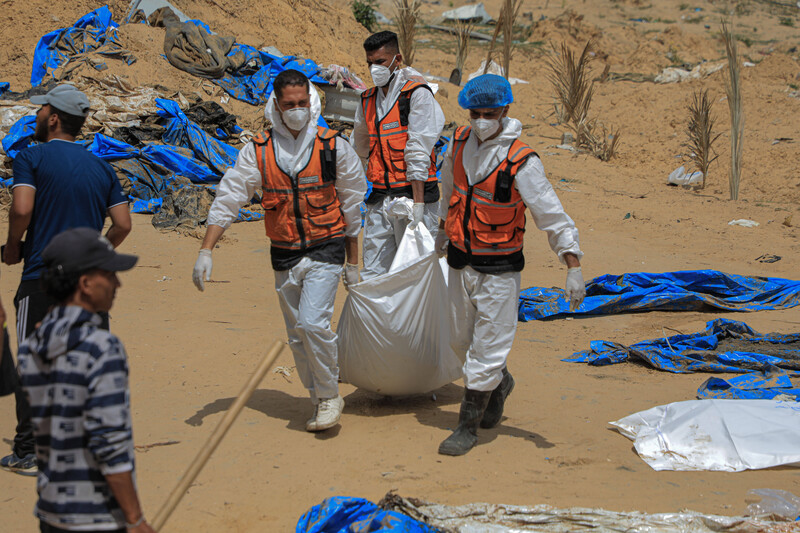The Electronic Intifada 1 October 2024

Workers carry an unidentified body found at Nasser Hospital in the southern Gaza Strip city of Khan Younis on 23 April. Thousands are missing in Gaza, with families desparate for news.
XinhuaThe harrowing anxiety over their missing loved ones that has surrounded many Palestinian families for months broke to the surface on 25 September, when 88 unidentified bodies were found in a container on a truck that reportedly came from an Israeli-controlled crossing into Gaza.
The bodies arrived at Nasser hospital in Khan Younis with no accompanying data. There were no names, no ages, and no locations of recovery noted, according to the Ministry of Health, which refused to receive them and sent the truck back to the crossing from where it had come.
“We cannot allow them to disappear into an anonymous grave,” said the ministry in a statement, which confirmed the number of bodies. “Each of these individuals has a family, a history, a life that deserves recognition. We are demanding that their humanity be honored.”
More than 10,000 people in Gaza have been reported missing. Many are believed buried under rubble, but authorities in Gaza have also accused Israel of systematically disappearing significant numbers of people.
For the families, the lack of information is agonizing.
Ahmed Kafarna, whose son Salah disappeared nearly a year ago, described the torment.
“For months, we have lived in uncertainty. Is my son alive? Is he dead? Now, we hear about these bodies, but how can we know if one of them is our beloved?”
“No parent should have to bury their child without knowing. Not like this.”
His voice faltered, as raw emotion seemed about to overwhelm him, but he kept talking: “We just need answers. We need to know.”
Without a body to mourn, many families find it difficult to process their grief. They cannot hold funerals or create a space to commemorate their loved ones, denying them closure.
Khaled, whose 28-year-old friend Mahdi Abu Seedo has vanished, echoed Kafarna’s anguish.
“Every day feels like a cruel game. You cling to hope, and then you lose it again. And there’s no end, no peace,” he told The Electronic Intifada.
Dignity
Hisham Mehanna, a spokesperson for the International Committee of the Red Cross, said international law mandates that those who have died during armed conflict be handled with dignity.
“It requires that the deceased be searched for, collected and evacuated, and that all available information must be recorded before disposing of the dead. This ensures that people do not go missing,” he told The Electronic Intifada.
Rights organizations have also weighed in. The Euro-Mediterranean Human Rights Monitor strongly condemned the manner in which the bodies were delivered to Gaza, emphasizing that Israel is obligated under international law and human rights standards not to mistreat the dead or their remains.
“Israel must take all necessary steps to identify the deceased, which includes recording as much information as possible and ensuring the dignified handling and transfer of the bodies, without interference with their graves,” the organization said in a press release.
For the families, every day without answers is another day of suffering.
Amina Nasir, 52, who has lost both her son, Nasir, and her brother Muhammad in the past months, said simply: “I have nothing left. No news, no body, no grave. Just memories and questions. It’s a torture I can’t describe.”
There are broader implications, too. Beyond the immediate suffering, this issue highlights a critical gap in how the international community addresses the rights of the dead in conflict zones. The Geneva Convention explicitly states that warring parties must keep records of the dead and facilitate the identification of bodies. But without enforcement, these legal obligations are too easily ignored.
The lack of clear information from Israel about the 88 bodies has fueled growing frustration. The Palestinian Ministry of Health has made it clear it will not back down from its demand for proper identification.
“We owe it to the families and we owe it to the dead,” a ministry spokesman, Ashraf al-Qedra, told The Electronic Intifada. “They are not just numbers or statistics. They are human beings who deserve to be treated with dignity, even in death.”
The international community’s silence on the matter is deafening, and families such as Salah Kafarna’s are left grappling with uncertainty.
“My son was a kind boy,” his father said softly, holding up a worn photograph. “He deserves to come home, even if it’s just to be laid to rest.”
Fedaa al-Qedra is a journalist in Gaza.





